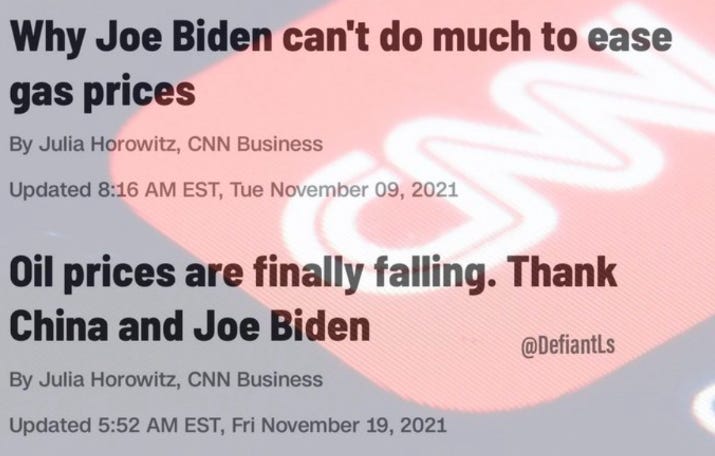PSA: The president does not control gas prices
This needs to stop

Every time gas prices spike in America, people who don’t support the president blame him. When gas prices plunge, people who do support the president credit him. For a while in 2021, people were putting Joe Biden stickers on gas pumps that said “I did that!” Believing that the president controls gas prices has been going on for decades, and it needs to stop. Why?
Because the president does not control gas prices.
It’s an odd thing to think. When car prices increase, the president doesn’t get blamed. When TV prices decrease, the president doesn’t get credit. And why should he? It seems very odd to say, “Sony TVs are 10 percent cheaper than they were last year. Thanks, President Biden!” Yet people do just that with gas prices. Sometimes it’s just venting. Purchasing gas is a major expenditure for many households, and having to outlay more money for the same good is annoying. For those who are living paycheck to paycheck, a 20 percent increase in gas prices can cause real problems. So blame the president. I’m sure there are people out there who know, deep down, that the president isn’t responsible for high gas prices. But just like saying “Thanks, Obama” when you can’t get your cookie into your glass of milk, blaming the president for high gas prices is an easy target. Others know better, but perpetuate the myth anyway:
These two articles were written 10 days apart!
So again, it’s not true. The president does not control gas prices.
Who does? Nobody. Oil, like other commodities, is bought and sold on a world market. On any given day, there is a prevailing price of oil. That price is determined by the world’s supply and demand. If you want to buy oil, you need to pay the world price. If you want to sell, you will receive that price. There may be exceptions, such as when Iran wants to sell oil on the black market and has to sell at a discount, but in general, that’s how it works. Nobody can simply buy a barrel of oil for $20 because a seller can get far more on the open market. Similarly, no one can sell a barrel of oil for $200 because a buyer can buy it from someone else for less. If the world price for a barrel of oil is $95, that price is determined by the thousands of companies that extract oil from the ground and the billions of people who use gasoline every day.
Are there groups that can influence the price of gas? Absolutely. OPEC, a group of petroleum-producing countries, controls enough of the world’s oil supply that they can increase or decrease prices to a certain extent. If terrorists were to successfully bomb a series of large oil refineries, that would also have an impact on world prices. Overall, however, these players are few and far between. The ultimate driver of oil prices is going to be simple supply and demand.
A big reason why is the sheer size of the gasoline market. The US consumes 20 million barrels of oil every day. The entire world consumes about 98 million barrels of oil per day. Numbers that large are hard to conceptualize. It’s hard to imagine that much being consumed today, and tomorrow, and the day after that, every day of the year. Nobody can control a market that size. Even OPEC failed to drive American frackers out of the market in the 2010s.
Can the president influence gas prices? Slightly. The US government does maintain the strategic petroleum reserve (SPR), a reserve of oil that is meant to be used in an emergency. President Biden did release millions of barrels of oil from the SPR to lower oil prices. But even a 50 million barrel release isn’t going to accomplish much; that’s only 2.5 days of US oil consumption. Emptying the entire SPR would likewise only decrease oil prices for a limited time, and would leave the US in a dangerous position. When full, the SPR contains 700 million barrels of oil, and the American economy will need that if a crisis ever disrupts the world oil supply.
The rest of the US government does have some influence over gas prices, mainly through taxation. The federal government charges about 18 cents for a gallon of gasoline and 24 cents for a gallon of diesel. States, counties, and cities can then charge their tax on top of the federal gas tax. Pennsylvania leads the way with a 58-cent tax on gas. So states could lower gas prices by decreasing or removing their gasoline tax, but this would deprive the government of an important source of revenue.
If governments have limited ability to lower gas prices, why do some countries have such cheap gas? In Egypt, for example, it only costs $1.41 for a gallon of gas. Even that pales in comparison to Venezuela, where a gallon only costs a few pennies. What gives? In these countries the government, rather than taxing gas, subsidizes it. The government pays for gasoline and then sells it at a deeply discounted price. This might sound great, but is ruinously expensive and a poor use of government money. Egypt spends a whopping 22 percent of government expenditures and seven percent of GDP on energy subsidies. To give a sense of scale, that’s far more than the US spends on its military.
Even the firms that make up the oil industry don’t profit as much as the media would lead you to believe. To be sure, the profits some companies make are huge. ExxonMobil made a record $55.7 billion in profits in 2022. It’s important, however, to put these numbers in context. The companies that make huge profits also sell a tremendous amount. The better statistic is profit margin. The energy industry’s profit margin is about 8 percent. This is decent but not out of line with other industries. So the US government can’t force ExxonMobil to lower their profits so that gas goes down to $1 per gallon. Even if oil companies’ profits were close to zero, it would likely only reduce gas prices by 10 percent.
At the end of the day, gas prices are decided by the entire world. Millions of gallons of oil are pumped out of the ground every day, shipped around the world, refined into gasoline, and sent to a pump near you. When the demand for gas increases, say because of a growing Chinese economy, gas prices will go up. When the supply of gas increases because millions of fracking wells have come online in the American West, gas prices go down. There isn’t a smoke-filled room of men in suits deciding what happens, let alone whoever is sitting in the Oval Office.


